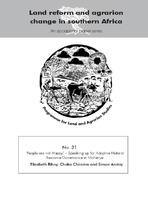| dc.contributor.author | Rihoy, Elizabeth | |
| dc.contributor.author | Chirozva, Chaka | |
| dc.contributor.author | Anstey, Simon | |
| dc.date.accessioned | 2019-03-07T12:28:54Z | |
| dc.date.available | 2019-03-07T12:28:54Z | |
| dc.date.issued | 2007 | |
| dc.identifier.citation | Rihoy, E., Chirozva, C. & Anstey, S., 2007. ‘People are not Happy’ – Speaking up for Adaptive Natural Resource Governance in Mahenye. Cape Town: Institute for Poverty Land and Agrarian Studies (PLAAS). | en_US |
| dc.identifier.isbn | 978-1-86808-649-8 | |
| dc.identifier.uri | http://hdl.handle.net/10566/4436 | |
| dc.description.abstract | This paper explores the ongoing events surrounding the CAMPFIRE project of Mahenye in Zimbabwe within the context of the recent discourse of crisis within community based natural resource management (CBNRM) and crisis within the country itself. Despite Mahenye’s geographical isolation and small size, it has played an influential role in the history and practice of CBNRM nationally and internationally over the last two decades.
Through an analysis of the perspectives and stories of the people of Mahenye and other stakeholders, it explores whether the current problems encountered in Mahenye are manifestations of crisis or whether they represent positive evolution and resilience in the face of adversity. The evidence suggests that CBNRM is a process of applied and incremental experiments in democracy, which is of
particular value because of the interaction of tiers of governance over time in an adaptive process. Despite the manifest problems within Mahenye, evidence suggests that CAMPFIRE has had a positive
impact in terms of empowering local residents, providing them with incentives, knowledge and organisational abilities to identify and address problems and constraints and to identify where external
interventions are required. This analysis illustrates that CBNRM is a political process and that implementers and policy advocates need to appreciate power relations and political landscapes in the quest for better governance.
The paper concludes that there are two critical elements requiring further attention by implementers. Firstly, there is need to restructure the economic mechanisms of CAMPFIRE in the face of the current national economic crisis. Secondly, there is a need to focus on and develop mechanisms that tackle the practical governance arrangements between the first and second tier institutions, in order to break down the existing social and politically constructed stalemates. | en_US |
| dc.language.iso | en | en_US |
| dc.publisher | Institute for Poverty Land and Agrarian Studies (PLAAS) | en_US |
| dc.relation.ispartofseries | Land reform and agrarian change in Southern Africa;31 | |
| dc.subject | Local governance | en_US |
| dc.subject | Traditional leadership | en_US |
| dc.subject | Shrinking incomes | en_US |
| dc.subject | Economic incentives | en_US |
| dc.subject | Natural resources | en_US |
| dc.subject | Mahenye | en_US |
| dc.title | ‘People are not happy’ – Speaking up for adaptive natural resource governance in Mahenye | en_US |
| dc.type | Book | en_US |

